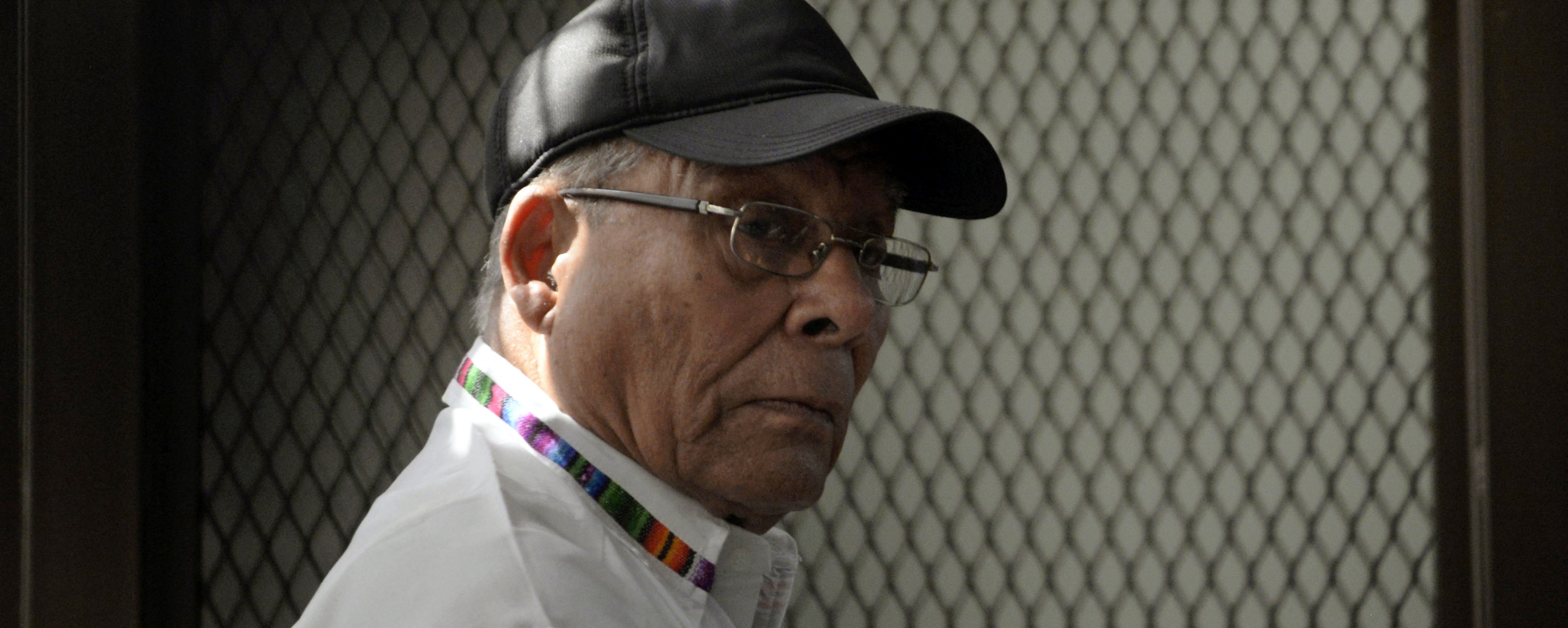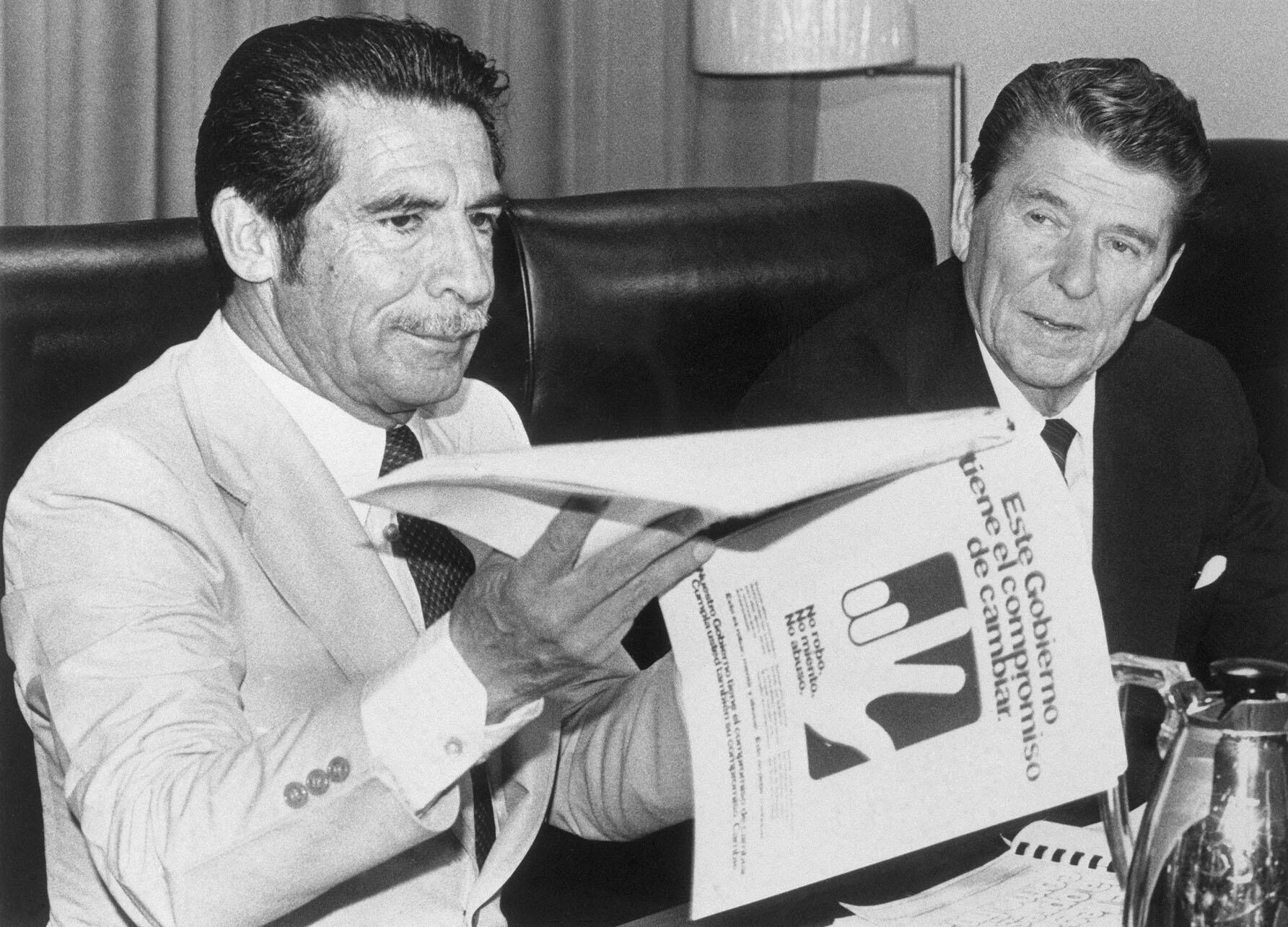Latin America
Related: About this forumIxil Genocide Trial Against Benedicto Lucas Garcia Nears End
Last edited Tue Oct 29, 2024, 08:37 AM - Edit history (1)
Eleven years after the genocide trial of ex-dictator Efraín Ríos Montt, that of General Benedicto Lucas García, a former chief of the General Staff, began this April. In over 85 hearings, witnesses, victims, and experts have testified about the scorched-earth campaign Lucas oversaw in the Ixil region in the early 1980s. A ruling could be issued as early as the first weeks of November.

Monday, October 28, 2024
Yuliana Ramazzini
General Benedicto Lucas García, an emblematic military leader from the Guatemalan armed conflict, who since April is standing trial accused of carrying out genocide against the Maya Ixil people, has been indicted three times in the past decade for war crimes.
Lucas, head of the General Staff under the dictatorship of his brother, Romeo (1978-1982), was accused in 2016 of forced disappearance in the CREOMPAZ case, related to over 550 victims tied by hands and feet in clandestine graves, but in February the Constitutional Court upheld his exoneration alongside six fellow officers, leaving the crime unpunished.
Lucas was convicted in 2018 in the disappearance of 14-year-old Marco Antonio Molina Theissen and crimes against humanity and rape of Emma, Marco’s sister, receiving 58 years in prison, which were commuted to house arrest in 2023. In November 2019, he was accused of genocide with two co-defendants: César Octavio Noguera Argueta, who died in 2020, and Manuel Callejas y Callejas, who was declared unfit to stand trial in January due to Parkinson’s Disease.
On April 5, after over four years of delays, the trial began. Lucas, excused for medical reasons, took an oath through a livestream from the Military Hospital, where he has listened to more than 85 hearings. His lawyers advised him not to immediately testify because he would need more time to read the accusation. But he did venture his first comments: ”My wife is an Indigenous-German cruce [literally, “crossbreed”, but referring to mixed ancestry] and I am a protector of the campesino [Maya] race.”
. . .
“When Attorney General Claudia Paz y Paz took over, she drew a lot of attention from international cooperation, so we had support,” Leiva continues. “The pressure with Ríos Montt was because perhaps he was a more emblematic figure and the most atrocious massacres are the ones committed by Ríos Montt.”
More:
https://elfaro.net/en/202410/centroamerica/27612/ixil-genocide-trial-against-benedicto-lucas-garcia-nears-end
~ ~ ~


. . .
It has been said that in Guatemala, ethnic cleansing was practiced on a scale beyond even that of Bosnia, and yet it has been kept hidden — until today. What took place in Guatemala was a frightening and ghastly system of state terrorism — the most gruesome human slaughter in Latin America’s violent cold-war period.
General Efraín Ríos Montt came to power in Guatemala through a coup in March 1982 and was deposed by another coup in October 1983, 17 blood-drenched months later. The most heinous state-sponsored violence of Guatemala’s civil-war era took place during the brief period he was in power. While President Reagan famously said in December 1982 that the dictator was receiving a “bum rap” and was “a man of great personal integrity and commitment,” for Guatemalans those months were a living nightmare from which many would never awaken. The elites and military eagerly tapped a willing United States for economic, military, and political support, even while it was known that atrocities were being committed against the defenseless civilian population.
The scale of the carnage is difficult to comprehend. The onslaught led to over 600 massacres, left over 10,000 people dead, displaced 1.5 million people from the countryside, and drove more than 150,000 refugees into Mexico. This trauma occurred in a country of seven million people. All told, an estimated 200,000 Guatemalans were killed over three decades of escalating conflict, 45,000 of whom simply “disappeared.” Tens of thousands of children were left orphans by the slaughter.
Now, the former head of state and all-powerful commander of the armed forces stands convicted of genocide and crimes against humanity in a historic verdict of global significance. “We are completely convinced of the intent to destroy the Ixil ethnic group,” Judge Jazmín Barrios told a packed courtroom as she summarized the guilty verdict rendered by the three-judge panel. “We consider that the accused, José Efraín Ríos Montt, had full knowledge of what was happening and did nothing to stop it, despite having the knowledge of the events and the power and the capacity to do so.” Judge Barrios and her two colleagues as well as Claudia Paz y Paz, Guatemala’s Attorney General, and her team, exhibited singular courage both in bringing the initial charges and skillfully conducting the trial during turbulent proceedings in a country where an aggressive and self-righteous elite and military still demand and expect to call the shots and forcefully insist on compliance. They did not get that this time, not from this court, and that may have changed the country forever.
More:
https://clacs.berkeley.edu/guatemala-bending-arc-history
Did Reagan Finance Genocide in Guatemala?
Ronald Reagan Had a Cozy Relationship With Guatemalan Dictator Efrain Rios Montt
ByABC News
May 14, 2013, 5:19 PM
May 14, 2013— -- On Monday, a Guatemalan court ordered the country's government to apologize to the Ixil population for the crimes of José Efraín Ríos Montt, a dictator who was sentenced to 80 years in prison for his role in war crimes committed between 1982 and 1983.
The verdict concluded that the army, under the command of Ríos Montt, had engaged in a campaign of genocide against the Ixiles, a small Mayan ethnic group. In that sense, it finally offered an answer to the thousands of victims' families who had pleaded for justice since the 1980s.
The trial did not answer all questions, however. For example, it did not place much attention on the extent of U.S. involvement in Guatemala during the 17 months of Ríos Montt's regime. That's in spite of the fact that America reached out to the Central American country offering military aid to combat left-wing guerrillas.
"U.S. military and intelligence units worked closely with the Guatemalan army over the decades of Guatemala's civil war," said Geoff Thale, Central America Program Director at the Washington Office for Latin America (WOLA). "Direct U.S. military aid was suspended during the Carter Administration, but then restored by the Reagan Administration, whose Cold War worldview clearly prioritized the fight against insurgents and their civilian supporters over respect for human rights."
Indeed, declassified documents and various reports by human rights organizations depict a story that was widely ignored during the trial, and that raises questions about U.S. foreign policy and the role the country played during the Ixil genocide.
More:
https://abcnews.go.com/ABC_Univision/News/ronald-reagan-finance-genocide-guatemala/story?id=19179627

Ríos Montt, the Evangelist
April 24, 2018
Rachel Nolan
Like many other Latin American dictators, Efraín Ríos Montt counted on the training and support of the United States. In 1951, he attended the School of the Americas in Fort Benning, Georgia. (In 2001, the school changed its name to try to escape its reputation as finishing school for dictators and death squad leaders.) But Ríos Montt’s most profound connection to the United States was through evangelical Christianity.
After a destructive earthquake struck Guatemala in 1976, two-dozen missionaries from a Eureka, California-based Pentecostal group traveled to Guatemala to spread the gospel and build houses. They converted a prominent general named Ríos Montt, who seemed to have won the presidency in 1974 only to have it stolen through electoral manipulation by his rival. Ríos Montt converted from Catholicism to become a preacher for the U.S.-based church and dropped out of politics for several years. He preached the gospel.
In 1982, Ríos Montt’s staged a political comeback and seized power in a coup. Jim Durkin, the leader of the Pentecostal church, traveled to Guatemala and said the dictator’s ascension was a “miracle” aided by God. As Virginia Garrard-Burnett chronicled in her book, Terror in the Land of the Holy Spirit, during his dictatorship Ríos Montt appeared on television each Sunday to give “Sunday sermons” on morality, even as he directed scorched earth campaigns in the highlands. In just one year, at least 10,000 people were murdered, most of them indigenous. More than 400 towns were wiped off the map. In 2013, a trial against Ríos Montt for genocide and crimes against humanity revealed he had ordered the massacres.
Here are just a few selections from the thousands of testimonies given to those who put together the U.N. Truth Commission report from the period when Ríos Montt was dictator. I include them to give a sense of the terror and destruction of entire families and communities that Ríos Montt unleashed, the abuses to which his evangelical allies were willfully blind:
An unnamed survivor from Aguacatán, Huehuetenango: “The military came to burn whole families out, to burn their houses and not just their houses but the people themselves. They burned men, women, and children who died in flames, incinerated. It caused us terror, it caused us a lot of fear.”
Any unnamed survivor from Rabinal, Baja Verapaz:“The military officials raped the girls who were 12 and 13 years old. The girls couldn’t do anything because there were so many soldiers lining up to take their turn. First they raped them and then they killed them.”
Another unnamed survivor from Rabinal, Baja Verapaz: “The children were kicked to death. The children shouted and shouted, and then they were silent.”
Even as word of the genocide leaked out, Ríos Montt maintained friendships with prominent U.S. evangelical Christians Jerry Falwell and Pat Robertson. Ronald Reagan had won the presidency in 1980 by flipping the evangelical vote away from the Democrats, who had helped elect Carter four years before. In 1982, Reagan traveled to Guatemala during the genocide and dismissed reports of abuses, saying that Ríos Montt was “totally dedicated to democracy in Guatemala.” Reagan said “frankly I’m inclined to believe” Ríos Montt has been “getting a bum rap.”
More:
https://nacla.org/news/2018/04/24/r%C3%ADos-montt-evangelist